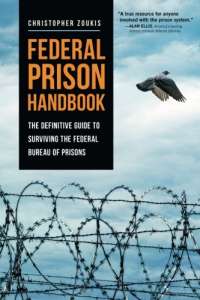 Christopher Zoukis, an award-winning incarcerated writer, is the author of the Federal Prison Handbook (Middle Street Publishing, 2017), Prison Education Guide (Prison Legal News Publishing, 2016), and College for Convicts (McFarland & Co., 2014). He regularly contributes to The Huffington Post, New York Daily News, and Prison Legal News. In 2016, the American Bar Association named Chris’ Prison Law Blog a Top 100 Law Blawg for Attorneys.
Christopher Zoukis, an award-winning incarcerated writer, is the author of the Federal Prison Handbook (Middle Street Publishing, 2017), Prison Education Guide (Prison Legal News Publishing, 2016), and College for Convicts (McFarland & Co., 2014). He regularly contributes to The Huffington Post, New York Daily News, and Prison Legal News. In 2016, the American Bar Association named Chris’ Prison Law Blog a Top 100 Law Blawg for Attorneys.
Tell us about your book.
The Federal Prison Handbook: The Definitive Guide to Surviving the Federal Bureau of Prisons is essential reading for all soon-to-be and current federal prisoners, their family members and their federal criminal defense attorneys. Unlike other prison “survival guides,” this book is based on extensive research which is verified through my decade of personal experience in federal prison and interviews with other experienced prisoners.
The goal of the Federal Prison Handbook is to help bring inexperienced individuals up to speed as quickly as possible so that they will have an informational foundation from which to make important life decisions behind bars. The idea is that a new prisoner could read the book, understand what is to come, foresee problematic issues before they present themselves, and then be able to make the best decisions possible as they live the issues in real time. Likewise, for experienced inmates, the book provides an in-depth look at Bureau policies and federal regulations applicable to daily life for inmates across the federal prison system.
Where the Federal Prison Handbook differs from other prison survival guides is in its well-researched and comprehensive approach. Readers can learn about every area of prison life, whether it be the admissions process, greeting cellmates for the first time, dealing with discussions concerning criminal charges, obtaining medical care, enrolling in educational programs, defending against disciplinary action, and much more. In addition to these narrative portions, the Handbook provides pinpoint citations to Bureau policies and regulations. This way readers can rely on my advice, but also see what the governing regulations state. This provides for a well-rounded policy understanding, along with discussions on actual practice.
In short, this is the only federal prison survival book, and policy guide, that you will ever need.
Why did you want to write a book?
I wanted to write the Federal Prison Handbook because when I first came in, I had nowhere to turn. Sitting in county jail I was lost. I had no experience with prisons and had no idea what was to come. My goal with this book was to produce something that would answer every “new fish” question from the very start. As a fellow incarcerated friend recently put it, “This is the book you wish you had read while still in county jail.” I take that as high praise.
For those considering this book or another on the topic, I can say that the Federal Prison Handbook will give you the informational foundation required to get you on your feet in federal prison as quickly, and safely, as possible. This book provides a large amount of information that you can only otherwise gain through hard earned experience. It will put you ahead of the game in many areas. And, God willing, it will help you to come out as unscathed as possible.
 What do you think are the main pitfalls for indie writers?
What do you think are the main pitfalls for indie writers?
I think the main pitfall for indie writers is ensuring that they publish a quality product, on par with books that traditional publishers release. Since indie writers are going it alone, they must wear many hats. First, they must write a quality book. Then, they need to contract with a talented editor. Once the manuscript is publication-ready, they need to bring on a cover designer who will work with them to get the right cover for their book. And last, the interior layout can’t be ignored. While there are self-layout systems out there, spend a few hundred dollars and get professional support.
Only by putting out a quality product will your book have a chance at real success and commercial acceptance.
What tips can you give other authors looking to self-publish?
Research self-publishing before going down this road. There is more to it than simply paying a service for an all inclusive package. You really need to understand every step of the process before you get to each step. Only by knowing and understanding what is going on, and what is required at each phase of the process, will you be able to ensure a quality product.
While self-publishing or independent publishing is complex because of the many moving parts, it is certainly possible to put out a product that will be a resounding success, so long as you put in the requisite time to gain a thorough understanding of all of the components and how to apply each.
As a writer, what is your schedule? How do you get the job done?
I look at writing not as a hobby, but as a job that I’m passionate about. As such, time management is essential. Being in prison there are generally three periods a day (which, of course, revolve around meals and inmate counts). These are between breakfast and lunch, between lunch and dinner, and between dinner and lockdown. Every day I try to devote at least one of these periods to writing. It is imperative to set a schedule or a work quota system and to stick by it.
As a prospective nonfiction book author, your job isn’t to write a book. Instead, your job is to write ten or twenty chapters. Each of these chapters will be broken down into smaller sections. By creating an outline of sections, you are no longer writing a 60,000-word book. Instead, you are writing 200 to 500 word sections on the topics listed in the outline. Thinking of it this way makes the process less daunting and more straightforward. Also, by breaking the larger project down into smaller bits of work, you can better schedule your time and ensure that you are being productive.
Why did you write about this subject?
As a nonfiction author, I write what I know. But, more importantly than that, I write where I see a need. My first two books concerned prison education. As a young man in prison, I wanted to further my education from behind prison walls, but there really weren’t any good books or resources out there to help me along this path. As such, I ended up conducting my own research, which eventually led me to write the Prison Education Guide. The knowledge I gained through this process helped me along my educational path, which saw me earn my Bachelor of Arts in Interdisciplinary Studies (business administration and legal studies) from Adams State University. I’m now enrolled in ASU’s MBA program.
As for the Federal Prison Handbook, the same thought process applies. When I was sitting in country jail, I was a scared teenager. I desperately wanted to know what was to come, but there was nowhere to turn. Now, a decade later, I found myself in a position to fulfill this need for others. I seized it with gusto. The Federal Prison Handbook was a labor of love, but also one which will help others who were in the position that I was a decade ago. God willing, they can learn from the book and have a less eventful introduction to prison life than I did.
What’s next for you as an author?
I have a lot of irons in the fire at the moment, but a few projects are more certain than others. For the past several years I have been doing a lot of writing for The Huffington Post, Prison Legal News, and the New York Daily News. I also just signed on as a writer for Criminal Law News, a new project of the Human Rights Defense Center. So, lots of articles in the works.
In terms of books, I’m at a bit of a crossroads. I’ve published three books in the last four years (though each was several years of work in the making) and am starting to think about second editions of each book. I think that I’m going to try to release a second edition of each of my books — Federal Prison Handbook, College for Convicts, and Prison Education Guide — each year, starting in 2018.
Have you ever dealt with censorship or retaliation due to your writing activities?
I think that virtually all visible prison writers suffer from some level of retaliation for their writing. I am most certainly no exception. Each time I release a book, a Federal Bureau Prisons staff member writes me up for allegedly conducting a business. They do so, I think, not because they feel that I’m doing anything wrong, but because it is an easy incident report to write, and if they are successful, they can cut off my channels of communication.
In 2012, for example, when I released my first book, I was issued three incident reports, thrown into solitary confinement for five months, and had several of my channels of communication (i.e., email, phone, visitation) restricted. In 2014, following the release of my second book (College for Convicts), they did it again, this time issuing me four incident reports. And in 2017, following the release of the Federal Prison Handbook, I was issued three incident reports and ended up spending six weeks in the hole. The crazy thing is that of the ten incident reports, nine have been overturned. I’m now appealing the final one.
Sadly, the First Amendment doesn’t tend to provide much protection in federal prison. The law is what prison officials say it is. But this is a cost that journalists and authors in prison must accept. At least I’ll be released soon and they will no longer be able to attack me for my Constitutionally protected speech.
What are your plans following your release from prison?
I’ll be released in early 2018, when I’ll be heading to Charleston, South Carolina. After getting settled, I plan on applying to law schools and doing some prison consulting. I sat for the Law School Admission Test (LSAT) this past February and scored in the 94th percentile. My hope is that with my LSAT score and solid GPA, a law school will give me a shot at proving my mettle. I’ve been a practicing jailhouse lawyer for the past decade. I’m ready to get out and prove not only that I am a changed man, but that I can contribute to society in a meaningful manner.
Where can readers go to learn more about your books, articles, and other work?
I can be found online at ChristopherZoukis.com, PrisonerResource.com, and PrisonEducation.com.
Links
Author Site
Zoukis Prisoner Resources
PrisonEducation.com
Twitter
Amazon
Goodreads
Get an Editorial Review | Get Amazon Sales & Reviews | Get Edited | Get Beta Readers | Enter the SPR Book Awards | Other Marketing Services






















Leave A Comment